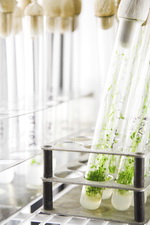
Study Finds Molecular Mechanism in Plant Translational Activity
October 28, 2015| |
 Researchers from North Carolina State University (NCSU) show how plants handle at the molecular level, the release of ethylene, an important gaseous stress hormone that regulates plant growth and stimulates fruit ripening process. Plant geneticists Anna Stepanova and Jose Alonso show that ethylene triggers a process that begins, but doesn't complete gene expression, one of the cell's most basic functions.
Researchers from North Carolina State University (NCSU) show how plants handle at the molecular level, the release of ethylene, an important gaseous stress hormone that regulates plant growth and stimulates fruit ripening process. Plant geneticists Anna Stepanova and Jose Alonso show that ethylene triggers a process that begins, but doesn't complete gene expression, one of the cell's most basic functions.
The researchers show that, when ethylene is perceived, transcription of certain genes that function as circuit breakers of ethylene signaling occurs, but protein production becomes restricted until ethylene is removed.
Their study shows that a key signaling molecule, EIN2, is an essential component in the ethylene-response process. EIN2 protein binds to the messenger RNA of the ethylene circuit breaker EBF2, incapacitating its protein synthesis, and thus allowing for a full activation of plant ethylene responses.
For more details, read the news release and abstract of the paper published in the journal Cell at the NCSU website.
| |
Biotech Updates is a weekly newsletter of ISAAA, a not-for-profit organization. It is distributed for free to over 22,000 subscribers worldwide to inform them about the key developments in biosciences, especially in biotechnology. Your support will help us in our mission to feed the world with knowledge. You can help by donating as little as $10.
-
See more articles:
-
News from Around the World
- USDA FAS Releases Nigeria GAIN Report
- Uganda's President Calls for Modern Science Thinking
- MSU to Conduct Study to Improve Potato Production in Bangladesh and Indonesia
- Study Finds Molecular Mechanism in Plant Translational Activity
- USDA Deregulates Biotech Corn MON 87411
- ICAR Signs MOU with SABC
- National Committee on Biosafety of the Philippines Celebrates 25th Anniversary
- Pakistan Celebrates World Food Day 2015
- Crop Genomics to Help Feed the World
- Research Shows Effect of CSR on Consumers' Perceptions on GE Food
- Molecular Mechanism Allows Predictability of Plant Flowering Time
-
Research Highlights
- Characterization of the Pepper CaPAO Gene for Defense Response to Salt-induced Leaf Senescence
- Identification of Key Genes Conferring Low Cadmium Accumulation in Barley Grains
-
Beyond Crop Biotech
- Genome of Asian Tiger Mosquito Sequenced
-
Resources
- ISAAA Infographic: Do You Know Where Biotech Crops are Grown?
-
Read the latest: - Biotech Updates (April 17, 2024)
- Gene Editing Supplement (April 10, 2024)
- Gene Drive Supplement (February 22, 2023)
-
Subscribe to BU: - Share
- Tweet
